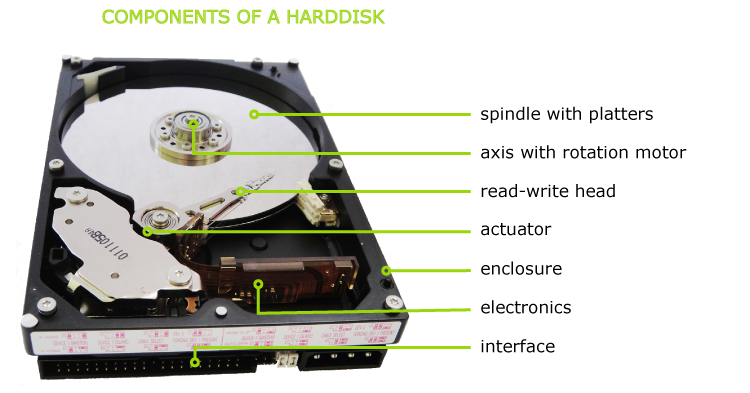Electronics and Interface
Will often suppress the less conspicuous but no less important components, "Electronics" and "interface".
The control electronics consist of a board on a chip that controls the motors of the drive, specifically the actuator for the read-write head.
The interface for communication with the rest of the system.
interfaces - bus - jumpering
differences are hard drives through their connections to the motherboard.
For example, IDE, SATA and SCSI.
IDE or ATA hard drive
IDE (Intelligent / Integrated Drive Electronics), also known under the ATA (Advanced Technology
Attachments). The IDE interface is used by home users in the area of DVD drive,
To connect CD drives or floppy drives.
jumper for IDE hard drives
To configure the IDE hard drives, it is necessary jumper (connectors) to be set. Per
IDE cable can be connected up to 2 devices. Pro motherboard has 2 IDE ports
Thus, a total of 4 drives per system will be operated. To specify which
Primary or Secondary Master drive is, the small jumper (jumper) is set.
S-ATA hard drive
The data recorded here are not parallel, but instead of serial. Accordingly, higher
Data transfer rates can be achieved.
Other advantages:
- Smaller cables, which have the advantage that air can circulate better for the cooling of the housing system.
- Smaller connector that can plug in better in the S-ATA port.
- Hot swap allows the exchange of hard drives without that the system must be shut down.
- No jumper settings required.
- possible external hard drives via eSATA (external Serial ATA) to connect
HDD SCSI (Small Computer System Interface)
Theoretically possible to drive up to 15 devices on the SCSI bus. Here are the SCSI cable
robust against electrical interference.
SCSI devices are mainly used for servers, higher speeds and because they
higher data security.
